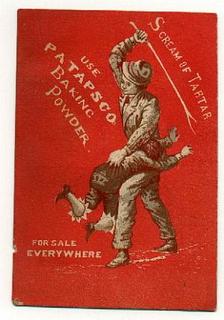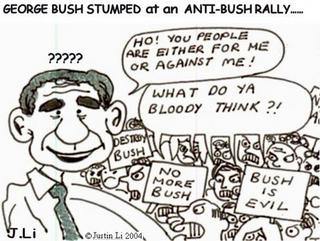Jersey Perspective
The Jersey Perspective is a comprehensive look at national politics through the eyes of three residents of Montclair, New Jersey.
Saturday, August 27, 2005
Thursday, August 25, 2005
Bush Administration Demotes Racial Stats Man
According to the Times, Lawrence Greenfield, the man selected by the Bush administration to head the Bureau of Statistics for the Justice Department, was demoted after he openly expressed frusteration with the administration's refusal to acknowledge statistics that showed that minorities were receiving significantly inferior treatment from the police than whites. Bob Herbert's column is available here, via Ablogistan.
Although a "cover up scheme" is only one of the thousands of reasons that Greenfield could have been demoted, it is, with all probability, the most likely. It's important that reporters get the president or the justice department to answer to the issue, as stories such as these only exacerbate relations between the police and the black and hispanic communities.
Mansion Means Hard Work for Weld
If the election were held today, Attorney General Elliot Spitzer would crush former Massacusetts governor William Weld by a margin of at least 20%. Currently Spitzer leads Weld in the polls 53% to 20%. Of course, it's unreasonaly to believe that a moderate Republican candidate would get less than 30% of the vote.
Interestingly, Spitzer also leads Republican Tom Golisano 52% to 23%. Who is the savior for the New York Republican Party?
Wednesday, August 24, 2005
Red States Endorse Child Brutality

Just kidding. But a new survey by SurveyUSA has illustrated yet another philosophical divide in our country in the issue of corporal punishment.
The survey covers three different forms of physical punishment: parental spankings, teacher spankings, and mouth washing. The right of parents to spank their children received widespread support, especially in Alabama, where it had an 87% approval rating. It's worst support came from Vermont, which still gave it a reasonable 55% approval rating.
However, the most interesting contrast came with the issue of teachers spanking children. Arkansas took the lead with a 53% approval rating, which was 20 percentage points higher than 10th place Indiana, and 45 points higher than last place New Hampshire. What could account for these enormous differences? Perhaps the People of New Hampshire are the true conservatives, who distrust large government and see a danger posed by granting teachers, who are officials of the government, the right to discipline their kids.
The state that loves mouth washing the most is Idaho. From what I've heard, it hasn't paid off. The People of Idaho are as obscene as the People of Hawaii or Massachusetts, which only gave the punishment a 25% approval rating.
Here is another survey that discusses corporal punishment disagreements between men and women, blacks and whites.
Here is a link to project No Spank. Guess where they stand on the issue.
Phillies Take Lead

The Philadelphia Phillies have now taken the lead in the National League wild card race with last night's 10-2 victory over the San Francisco Giants.
The Phils are now leading the Mets, the Marlins, the Nationals, and the Astros in the close race. The rest of the Central division is pathetic, with Milwaukee languising in third place below .500 and, as is the West, where the Padres are in first place below .500.
Unfortunately, the Astros will probably take the lead and go to the playoffs, as the phillies, in the last century, have only sent good teams to the post-season, and this year's team has been mediocre. However, the team has become more exciting in recent weeks because of unexpected good pitching from Vincente Padilla, Robinson Tejeda, Jon Lieber, and Brett Myers, as well as the blossoming of rookie first baseman, Ryan Howard, who went 4-5 with 3 RBIs last night.
Where Will This Red Go?

With the recent polls showing the President and the Congress at odds with public opinion, the likelihood that the Democrats may take back the Senate is increasing.
However, national sentiments aren't the only factors in statewide elections. In fact, they often prove to play a relatively insignificant role in many states. The U.S was strongly in favor of civil rights for blacks well before the deep south began to elect congressmen who represented these opinions. Nevertheless, the Democrats seem to have everything going there way in 2006 anyhow. Not only is there a lack of opposition from the GOP against incumbent Democrats, in those states that are leaning more and more against the Bush administration, but several Republican states have started to turn on Republican senators for various reasons...
Mark DeWine, of Ohio, is gearing up for a tough race in a state with the lowest rated governor in the country, Republican Bob Taft, who is widely anticipated to resign in disgrace in a matter of weeks. The Republicans there are associated more closely with corruption than Democrats in New Jersey, and apparently, Ohioans don't like corruption as much.
Conrad Burns, of Montana, is showing suprisingly low poll numbers and has been the target of a barrage of Democratic advertisements in recent weeks. Montana, which has a popular Democratic governor and a Democratic State House, could likely return to the days of populism and have two Democrats in the U.S Senate.
Rick Santorum of Pennsylvania needs to start moderating if he wants to have a chance next year. He's running against a man who not only has the name recognition that comes with being the son of a popular former governor, but received more votes than any other Pennsylvania official in state history. He was running for treasurer...
Lincoln Chafee does not get the kind of love that fellow New England moderates Olympia Snowe and Susan Collins get from their constituents. Why? Perhaps it's because he seems like a bit of a waffler. He openly pondered switching parties on election day 2004, and announced that he didn't vote for Bush or Kerry, and moreover, he is being attacked by Democrats for his campaign consultants, who are mainly former Bush workers.
Tuesday, August 23, 2005
We’re all to blame (all the Americans, that is)
 Welcome back to ‘70s, and not because Converse All-Stars are popular again. What we are welcoming is the return of high oil prices. It’s not that big a deal though, because we only use oil to heat our houses, pave our roads, and, oh yeah, fuel our cars.
Welcome back to ‘70s, and not because Converse All-Stars are popular again. What we are welcoming is the return of high oil prices. It’s not that big a deal though, because we only use oil to heat our houses, pave our roads, and, oh yeah, fuel our cars.We all know the deal about the higher oil prices. So whose fault is it? We could blame it on the Chinese, because their demand is growing at an even faster rate that ours. However, if you go a little deeper into the facts, you will find that they are actually helping our economy, namely by providing us cheap stuff and buying our bonds, which makes our houses worth more. We could blame it on OPEC, but this time it really isn’t their fault. Underinvestment has caused shortages, but not shortages large enough to cause prices to rise more than six hundred percent over the past half decade. So are we really to blame for our own problems? Looks that way.
American society is built upon larger-than-life ideals. The cars we drive are no different. Eighty square feet? Sweet. And that’s all great when oil is $10 a barrel and gas under a dollar a gallon, but not quite as great when oil is pushing $70 and gas $3, with no signs of slowing. The price of oil has jumped twenty percent in the past month alone, making for a virtually vertical upward line on a crude oil price graph. It does seem unlikely that prices can continue upward at this blistering pace, but the scary thing is that we really don’t know. Prices will probably dip eventually, but maybe $4 or even $5 a barrel gas in the not-so-distant future isn’t quite as insane as you may think.
It’s easy to blame ourselves, the consumers, but it’s even easier to blame our government. Not counting the new energy bill, because it is a complete joke conservation-wise and in most other aspects also, they have done absolutely nothing to alleviate the problem. Now I know it’s hard to tell Americans that they can’t buy something, but the gas-guzzling of SUVs and other highly fuel inefficient vehicles may cause a fundamental shift in our society. In China, as we speak, people are lined up for miles waiting for gas. Do we want that to happen to us? Do we want to let the problem get so out of hand that we have to tell consumers that there isn’t enough gas for them to drive their car? The government, by trying to appease SUV owners and stagnant American auto makers by not issuing any meaningful regulations encouraging fuel efficiency, may ultimately cause everyone to lose if prices continue to rise rapidly.
Indeed, Americans are a very resilient people in a very durable economy and doomsday is not as inevitable as it seems sometimes. Already, we have been able to eat the rising prices of oil by dipping into our housing wealth, which has also risen tremendously since the turn of the millennia. However, how long we can continue to disregard rising oil prices is unsure at best, and the only way to stop these from rising, at least at the current ridiculous pace, is by enacting reforms that place sensible limits on how incompetent a car can be. Americans like to live large, and there is nothing wrong with that, except for when it could cause an unwanted shift in our society as a whole. We live and breathe oil. The last thing we want is to, for all intents and purposes, run out of it. The time to act is now.
Tom Kean Jr. Update
Tom Kean Jr., the Jersey Republican and son of popular former governor Tom Kean Sr, continues to move to the center in search of a U.S Senate seat, reports PoliticsNJ.
Kean remains the only Republican openly seeking the party's nomination for the 2006 Senate race for the seat currently occupied by Democratic gubernatorial candidate Jon Corzine. He has name statewide name recognition and, more importantly, national support. Republican contributors recognize the difficulty of electing a party man from the Garden State to a senate seat (it hasn't been done since 1974) and they're willing to compromise on Kean's moderate positions.
However, the GOP base in New Jersey has shown a lack of enthusiasm for the man that some conservatives call RINO (Republican in Name Only). Although he has attacked Democrats on the same issue that just about every Republican has: corruption, he also voices strong support for environmental restrictions and has made "sprawl control" a personal mission. Assemblyman Michael Doherty warned Kean supporters that competition in the primary is likely and that it is likely to be "from a conservative".
The Republican National Committee understands what New Jersey voters want from a Senate candidate, regardless of party, and they want to provide that candidate in Tom Kean Jr. If Kean is not nominated, the GOP's hopes for a seat pickup in 2006 are looking very dim, as the Garden State does not seem to get along with the neo-cons that currently make up the Republican Senate Caucus.
Democracy, America, and the World: Part II, Give Me Liberty or Give Me Death (1776-1783)
 War usually comes as a last resort. The American Revolutionary War was no exception. Even as British armies fought at Lexington and Concorde in 1775, most still believed there would be a peaceful solution. However, as is so often true when directly antagonistic ideologies clash, their arms clash also. Britain viewed its American colonies as some sort of maid whose sole purpose was to serve the motherland. Americans shared no such view.
War usually comes as a last resort. The American Revolutionary War was no exception. Even as British armies fought at Lexington and Concorde in 1775, most still believed there would be a peaceful solution. However, as is so often true when directly antagonistic ideologies clash, their arms clash also. Britain viewed its American colonies as some sort of maid whose sole purpose was to serve the motherland. Americans shared no such view.Many factors make America a distinct land. One of the most important is the heterogeneous culture of people that are in origin or gene from other countries but in heart American. In 1776, America was a place where people, whether from Britain or, for the most part, other European countries, could come to escape the tyrannies of their homeland and start a new future. Religions that were persecuted in Europe founded were welcomed in America. This allowed for a mobile society, unlike the largely static one in Europe, that was built on hope and prosperity rather than fear and oppression.
It is unfair to categorize George III as some Hitler or Stalin-type figure, but he was a far cry from a ruler of a liberal republic. The British Empire was founded on the concept of money and power, one that the Americans ultimately decided, by grinding through a war in which they were supposed to be decimated in, they no longer wanted to be a part of. However, despite all these factors, war was still not the only solution. Even through mid-1776, colonial leaders were partitioning to their king for peace.
Yet when they recognized that he required complete subservience from his colonies and they required at least a limited independence, the Declaration of Independence was issued, stating the ideals of an American nation and the desire to leave to Empire. I am not going to attempt a military history of America in my series, not for the least of reasons that I don’t know very much about military strategy and the likes. However, I can draw one conclusion about the war: America won. With the help of foreign powers who also wished to suppress the British Empire, independence was won, and revolutionaries such as Samuel Adams, Thomas Jefferson, and George Washington became American national heroes rather than traitors to the British crown. Fighting stopped in 1781 when the Americans cornered the British in Yorktown, and the Treaty of Paris in 1783 officially ended the war. Britain ceded all of its territory east of the Mississippi to the new American country, leaving the Americans to govern and tax themselves as they chose. However, although independence had now been achieved, there was still the question of what to do with it.
My Two Cents on Hugo Chavez
 Hugo Chavez is not the most attractive foreign politician to Americans. He is a demagogue, a communist sympathizer, and most importantly, fervently anti-American.
Hugo Chavez is not the most attractive foreign politician to Americans. He is a demagogue, a communist sympathizer, and most importantly, fervently anti-American.However, he is remarkable. He has energized his entire country, for better or worse, and has brought attention to a vast constituency that was previously ignored in Venezuela: the poor. He has proven this by many symbolic (and practical) gestures that are not uncommon in U.S politics, especially in urban areas. He has opened health care centers, schools, and hospitals that show that his priorities are with the people of Venezuela; not the special interests.
However, as seen often in South American politics, Chavez is not all good. He recently announced a massive spending plan for the purchase of 50 Mig-29 fighter jets. The plan would cost $4 billion and would do nothing but antagonize the western hemisphere, which seems to be content with one super power. He is on extremely good terms with Fidel Castro, which is not unreasonable as they are neighbors, and has allegedly showed his solidarity by implementing communism classes in public schools, which is relatively threatening. Moreover, he has waged battles against private schools that do not follow his self-serving curriculum.
To address the most popular hit on the blogosphere, Pat Robertson does not know what he's talking about. Besides the obvious hypocrisy of a Christian leader advocating murder, Robertson seems to ignore the fact that Chavez is popular in his country, and has received support in the form of election victories, despite the cries of fraud from the opposition. Perhaps if Pat Robertson reviewed the history of U.S sponsored assassinations in South America, he'll understand why it's not a good route to democracy. The last time the U.S assasinated a "commie", the replacement, General Augusto Pinochet, helped install freedom by "disappearing" over 30,000 Chilean citizens.
Here are some quotes from the "Old" Pat Robertson.
Monday, August 22, 2005
Sweden Beats Us Again

Enlighten-New Jersey had an interesting post describing the lack of women in New Jersey state politics. Although Ken Adams, of Smadanek, quipped that perhaps women in New Jersey are excluded from government only because they are less corrupt, I'm interested in examining another theory that takes us back to our ancestors in the Old World.
Although Europe is not the only continent with cultural ties to New Jersey, it is by far the most dominant in state politics, and will probably continue to be for a long time, especially in light of the state's reluctance to change politically. Furthermore, the most influential ethnic groups in New Jersey have been from southern Europe, where men have traditionally had more defined roles as the leaders of the family and community-or more accurately- the representatives of the family and community. I am not simply alluding to stereotypical descriptions of Mafia-run Sicily, but to the numbers that show that southern European democracies such as Greece, Italy, France, as well as Eastern European nations that have provided New Jersey with an abundance of tradition and culture such as Poland and Russia, allow women minimal participation in government. According to the United Nations datasheet, the mentioned countries have women participating in less than 20% of ministerial positions and less than 25% of sub-ministerial positions.
In contrast, states such as Minnesota, with strong ties to northern Europe, have a significantly higher percentage of women in government. For instance, the Minnesota Senate has 23 women out of 67 members, which is much higher than New Jersey's measly 19 out of 120. Interestingly, the countries with the highest percentage of women in ministerial positions (with over 30%) were Barbados, Finland, Sweden, Liechtenstein, and Seychelles. Denmark, Luxembourg, Holland, and Norway weren't far behind.
The differences between Protestant and Catholic cultures should also be examined, although it's necessary to mention that Ireland, a predominantly Catholic nation, has a high percentage of women in government.
Is this plausible reasoning? Or are there too many other factors that I didn't take into consideration?
What Is Going On With the GOP?

If you go to Stranger's Almanac, a left wing blog that describes itself as a "forum for pissing off conservatives", you'll find several dozen quotes given by Republicans during the Clinton administration's Bosnia campaign.
They are interesting quotes, and they certainly don't sound like the most current rhetoric given by the Bush administration and the Republicans on Capitol Hill. However, the reasons are almost completely partisan and not due to a shift in ideology on the part of the GOP. The party recognized in the 90's that any war or peacemaking process that the Clinton administration got itself involved in could reap enormous benefits come election time, and now the Democrats have realized the same in relation to the Iraq war. Polls have indicated that Americans are not looking favorably upon the situation in Iraq, and the President's terrible communications skills have polarized the nation, as he has repeatedly refused to budge from his exhausted rhetoric about "staying the course" and "fighting for freedom".
While the President's words are laudable in theory, they represent empty ideals, and do not address the real situation in Iraq. It's important for politicians to have goals and visions for their actions, but it's also important for them to take responsibility when they go wrong. President Bush is supposed to be serving the American People, and when 75% of these constituents believe that the casualties in Iraq are "unacceptable", he needs to communicate what the problems are and how he is working to solve them, rather than to give the same rhetoric that got him elected, when the public had a much more favorable view of the war in Iraq.
If Bush doesn't do this, he could hurt his party bad in 2006.
Sunday, August 21, 2005
Pro-Bush Crowd Counters Sheehan Movement
According to the Hedgehog Report, a settlement of Bush supporters has sprung up in Crawford, Texas, in hopes to counter the anti-war movement being led by Cindy Sheehan, a mother who lost a son in Iraq.
David Wessing of Hedgehog, describes the actions of Sheehan's followers as disgusting, citing their installation of crosses with the names of dead soldiers leading up to the Crawford ranch. One man in particular, Gary Qualls, who also had a son die in Iraq has personally removed the cross with his son's name, Louis Quall, as he believes that Louis would have supported the president.
Wessing later states that the mainstream news media will make sure not to cover the Qualls case as fervently as the Sheehan group. That might be true, but for the first time during the war, Sheehan's anti-war sentiments actually do represent the majority of Americans, as 57% of Americans believe that the Iraq was a mistake and 52% believe that the Iraq war has not contributed to the United States's security.
Notable Quotes: Pedro Martinez
 "Willie's decision was correct. It will always be the correct decision. He who has the power will always be correct. Don't ever forget that."
"Willie's decision was correct. It will always be the correct decision. He who has the power will always be correct. Don't ever forget that."-Pitcher Pedro Martinez of the New York Mets on Manager Willie Randolph's decision to pull Pedro after only six innings of work and almost leading to what would have been a costly loss for the Mets
This quote actually fits in with my series. All I can say about right now it is that it wasn't people like Pedro who lead the Revolution, a topic I will soon touch on.


